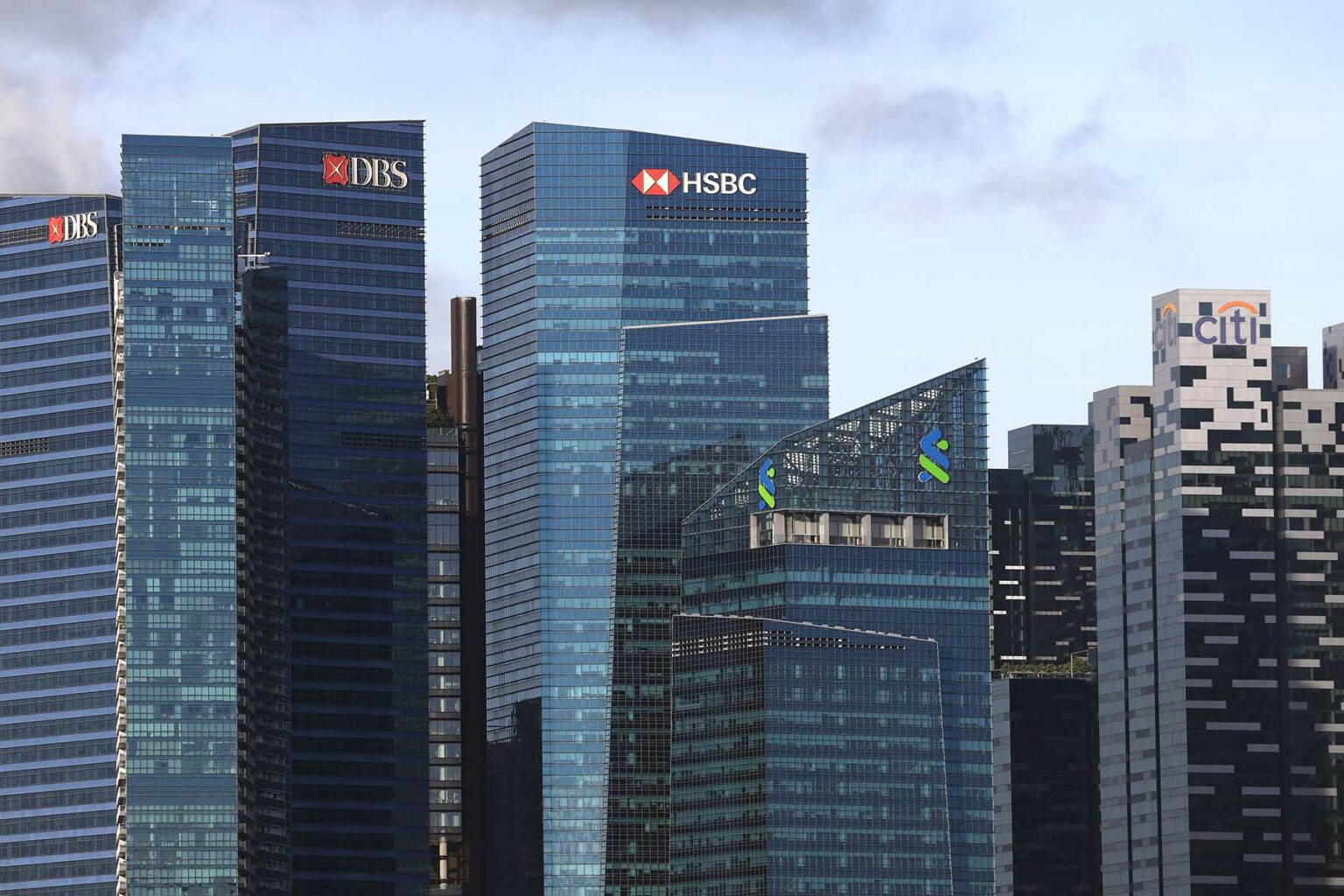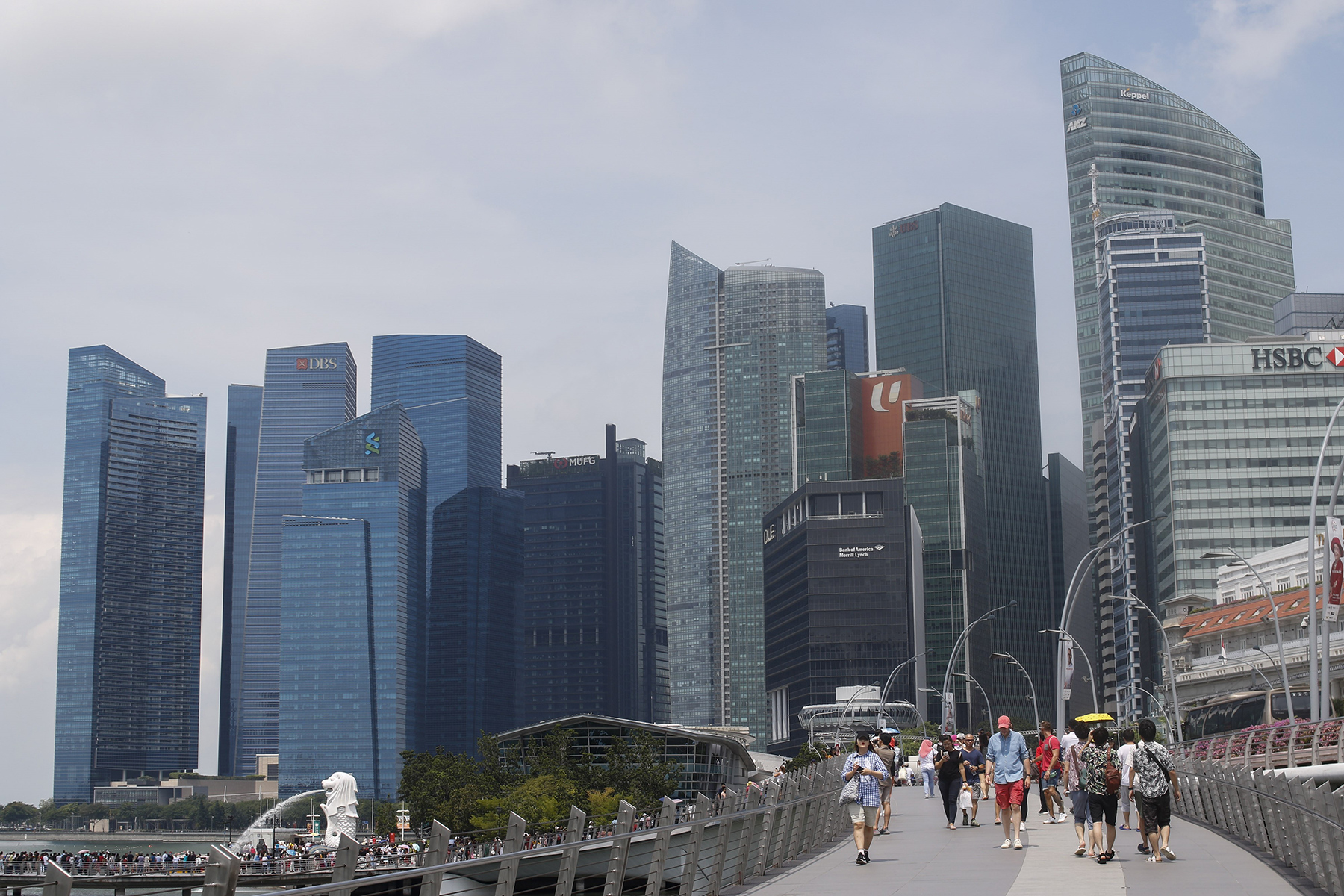Singapore may be a global financial center, but as a new arrival, your priority will be arranging your own banking needs. From opening a bank account to navigating payments and fees, the world of banking may seem like a daunting task. This is particularly true in a country such as this, which has one of the most technologically advanced financial systems in the world.
Getting started can be tricky, but once you have mastered the ins and outs of the banking system, you will be amazed at how quickly and efficiently everything works.
To help you get started, this article covers the following:
- The banking system in Singapore
- What currency does Singapore use?
- Banks in Singapore
- What services do the banks in Singapore cover?
- How do you open a bank account in Singapore?
- What payment methods are available in Singapore?
- What banking fees can you expect to pay?
- What offshore banking options are available?
- Which banks have ethical policies and processes?
- Measures against banking security and fraud
- How do you complain about banks and financial services?
- Does Singapore offer any alternatives to traditional banks?
- Useful resources
Wise
Do your finances go beyond borders? Then you need a fast and secure way to move money internationally. Wise is a global leader in online international money transfers, letting you move money at an exchange rate several times cheaper than your bank. Whatever your personal or business needs, Wise can make your money go further.
The banking system in Singapore
Singapore is one of the world’s biggest financial hubs. Both local and foreign banks operate in the country, and the industry is tightly regulated by the Monetary Authority of Singapore (MAS).
In 2001, the government introduced new laws giving foreign banks greater freedom to operate in the country. As a result, local banks are now facing more competition from their foreign counterparts.

There are six local banks in Singapore, compared to more than 100 foreign ones. While most foreign banks operate as wholesale banks, many of them offer full banking services.
The banking sector is one of the most important fields in the country, with a total asset size of almost US $2 trillion. There are many different types of banks and services to choose from.
There is also a growing demand for Islamic finance. However, this remains a work in progress and the retail market is still lacking Shariah-compliant products and options. This may be partly because Singapore takes a very strict approach to the separation of religion and state.
What currency does Singapore use?
The national currency is the Singapore dollar (SGD). The smallest unit is the cent, with 100 cents making one dollar. The smallest bill available is S$2, and there are also bills of S$5, S$10, S$20, S$25, S$50, and S$100.
In the past, S$1,000 and S$10,000 bills were available. However, these are no longer issued due to concerns about money laundering. That said, some are still in circulation, and they are technically still legal tender, although most expats probably won’t encounter them.

Local expert
Gayatri Bhaumik
Insider tip
Although it is not common to see S$1,000 or S$10,000 bills in daily life, some stores feel uncomfortable accepting them. Therefore, it is advisable to take them to a bank rather than try using them.
Coins are available in small denominations of 1c, 5c, 10c, 20c, 50c, and S$1. However, some vendors refuse payments made with coins and indicate this with written signs in English.
Cash machines and ATMs
Finding an ATM in Singapore is never a problem as there are cash machines all over the country, in bank branches, supermarkets, and shopping malls. As Singapore is a multicultural country, these may be signposted in several different languages. However, the term ‘ATM’ is always used.
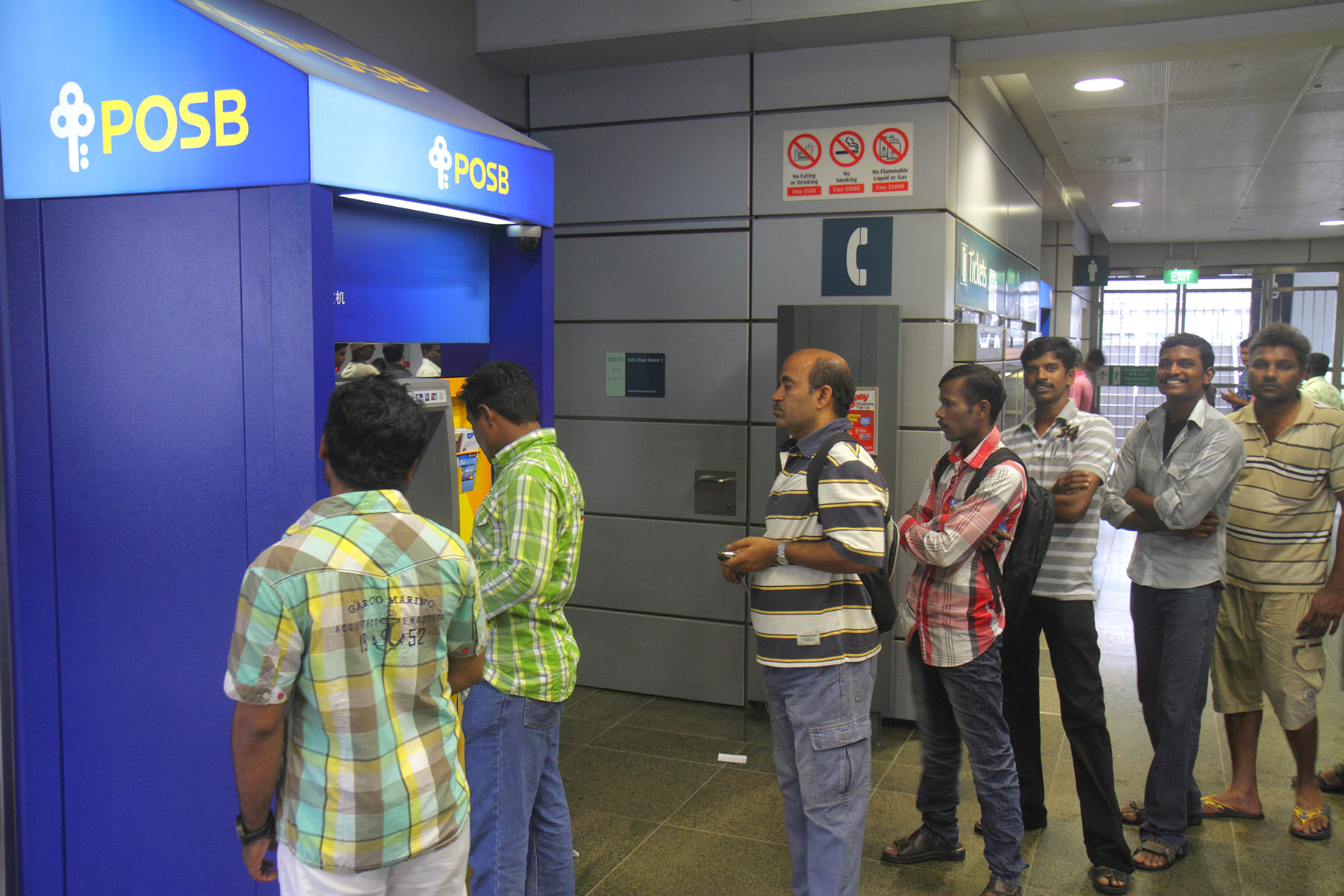
Fortunately, ATMs in Singapore accept cards from around the world. It is important to watch out for exchange rates and bank charges when using ATMs in Singapore. If you are using a card from another country, then your home bank may apply a fee. You can check this in advance.

Local expert
Gayatri Bhaumik
Insider tip
You should watch out for an unusual quirk when entering the PIN code.rnrnSingapore-issued bank cards tend to have a 6-digit PIN code instead of the four digits that are standard in many other countries.rnrnAs a result, the on-screen display may look a little unusual. However, entering a 4-digit PIN code and hitting ‘OK’ should work.
There are many international banks in Singapore, some of which offer free or low fees to global customers. If you have a Singaporean card, however, then there is no need to worry as ATM withdrawals do not carry a local operator fee.
Banks in Singapore
There are a number of different types of banks in Singapore, including the following.
Private banks
As a financial center, Singapore has several private banking options available for high-net-worth individuals. However, to open a private banking account, you will need to invest a minimum amount. This can range quite significantly, from S$200,000 for OCBC Premier Banking to S$5 million at DBS Private Bank.
If you have the assets, there are plenty of benefits to private banking. For example, you can enjoy a bespoke service, special investment opportunities, and unique interest rates. Private banks often offer other perks as well, ranging from cashback on hotels and cruises to exclusive networking events.

Many internationally-minded high-net-worth individuals in Singapore prefer to use standalone private banks and wealth management services, such as Pictet. However, it is worth shopping around before signing up for any particular private banking service to ensure that it meets your particular needs.
Some of the most popular private banks in Singapore include:
Public banks
There are many different public banks to choose from in Singapore and you won’t usually need a minimum deposit to open an account with them.
Public banks will generally offer a contactless credit-enabled debit card and online banking as standard. They can also issue credit cards, loans, savings accounts, and other financial services.
Most banks are open until 17:00 on weekdays and in the morning on Saturdays. However, this can vary from branch to branch, so it is best to check the bank’s website ahead of time.
Legally, Singapore has a five-day clearing week, which means that funds can only be cleared from Monday to Friday. You will be able to walk into a branch and go straight to the counter, but you may need to make an appointment for more complicated matters.

You will find English-speaking staff at public banks, and you can expect all the documents and online services to be provided in English.
There is a mixture of local and international banks in Singapore, and the most popular ones among expats include:
Cooperatives
Singapore has a small number of cooperative banks. These are similar to public banks but do not have an owner or any corporate stockholders. Instead, the members of the cooperative own and govern the bank as a collective.
Like public banks, cooperatives offer financial services such as loans and savings accounts. They tend to have similar opening hours as public banks, but there are fewer branches, and you will often have to make an appointment before visiting.
Cooperatives are not a popular banking option for expats, which is partly because they usually limit membership. For example, the SGS Coop offers loans and savings accounts with favorable rates, but only to civil servants.
Even more open cooperatives, such as the TCC, limit membership to Singaporean citizens and permanent residents. Therefore, expats who are temporarily in Singapore will need to use a different kind of bank.
Investment banks
Most investment banks in Singapore are international and part of well-known multinational brands. They provide financial expertise and strategic guidance to business clients in the country.
However, since the Singaporean market is dominated by either family- or state-owned companies, there are not many major mergers and acquisitions deals inside the country. Its investment market also remains significantly smaller than in cities such as London, New York, and nearby Hong Kong.
Despite this, the stability of Singapore’s economy makes it the primary regional hub for companies in Southeast Asia. And while the country is not an emerging market itself, it offers investment banks access to many nearby emerging markets.
Some of the major investment banks in Singapore include:
Online banks
Regular public banks in Singapore include online banking as one of their services. By contrast, digital-only banks generally have no physical branches, which means that customers will need to do everything online.

Digital banks tend to offer services such as current accounts, savings accounts, and fast payments. Many are targeted towards frequent travelers or expats, allowing multiple currency accounts, easy foreign transactions, low-cost currency conversion, and other perks.
There are two official digital banks in Singapore, which are GXS and MariBank. Other digital banks do not have a MAS full banking license, which means that they cannot offer certain services such as loans or credit. However, they are still regulated by the MAS.
Many expats choose digital banks for ease of use and convenience. Some of the most popular choices in Singapore include:
International banks
International banks operate in the same way as public banks in Singapore. Some expats choose to use the same bank as they do in their home country, as they are already familiar with the way it operates.
It is worth checking with the bank to see if it offers cross-border customers any special perks, such as rewards programs. However, not all banks offer these benefits, and customer service can sometimes vary from one country to another.
A potential downfall of using an international bank is the lack of physical facilities. While Singapore’s local banks have branches and ATMs across the country, international banks may be more limited.
Therefore, before opening an account, you might want to check how many branches and ATMs the bank has, and where they are located.
Some of the biggest and most popular international banks in Singapore include:
What services do the banks in Singapore cover?
Banks in Singapore offer a full range of services, including the following.
Current accounts
Current accounts, also known as checking accounts, are the most basic banking service. Customers use these for their day-to-day finances. There is usually no minimum deposit required to open a current account and the bank will issue you with either a debit card, a NETS Prepaid Card, or both.
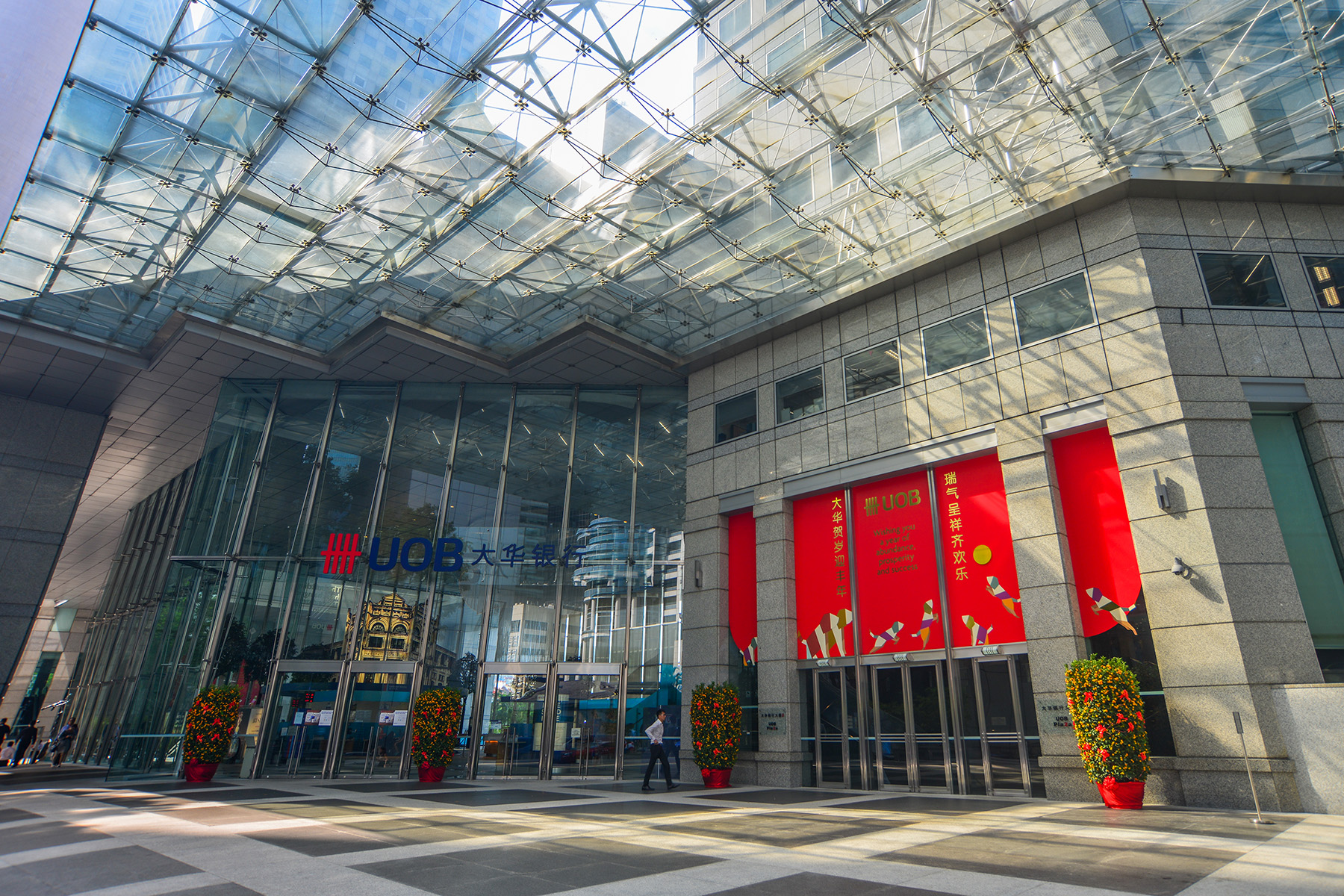
Loans and overdrafts
Loans and overdrafts are lending services. An overdraft is a short-term credit option, which is usually available for up to 12 months. A current account may not have an overdraft as standard, but if you want one, you can opt for either a secured or unsecured overdraft.
Notably, a secured overdraft requires you to use an asset as collateral, while an unsecured overdraft does not. You will need to earn at least S$30,000 a year to be approved for an unsecured overdraft which is up to four times your monthly income.

Local expert
Gayatri Bhaumik
Insider tip
It is important to be aware that overdrafts usually have a higher interest rate than loans, and you can face heavy penalties if your account goes into excess.
You will need to earn a certain monthly salary to take out a loan. Depending on the bank, the minimum requirement may be higher for expats than for Singaporean citizens and permanent residents. Moreover, expats will often need to pay higher interest.
Loans can be secured or unsecured, and the latter have higher interest rates. The amount that you can borrow is usually based on your salary, and banks may offer term loans, with a set repayment period, or revolving loans.
If you want to take out a loan, you should make an appointment at your bank. The staff may ask you to show documents that prove your salary and solvency.
Mortgages
A mortgage, or home loan, is a specific category of loan used to buy a property. Each bank will set its own eligibility requirements, including minimum monthly income, minimum and maximum age, and more. Banks will often have requirements based on residence status, and many only offer mortgages to Singaporean citizens and permanent residents.
Similarly, Housing & Development Board (HDB) grants, which are managed through the Central Provident Fund Board (CPF) and HDB and come with favorable rates, are only approved if at least one applicant is a Singaporean citizen.
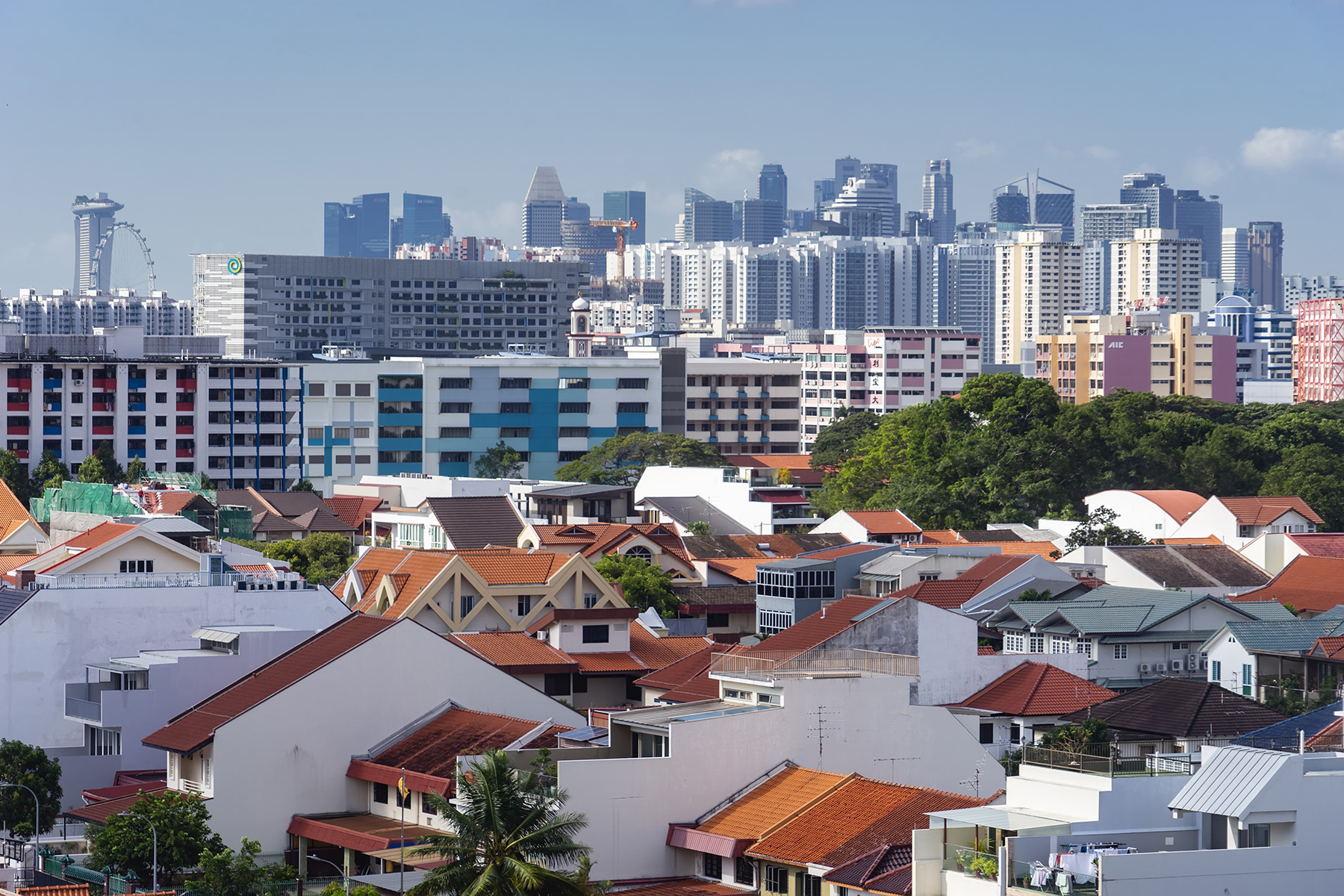
A mortgage may have a fixed rate or a floating rate, and a calculator lets you see how much you will pay over time. Many mortgages start with a promotional rate, which will increase over time.
Your bank is legally required to inform you 30 days in advance if the interest rate is going to change. However, even during periods of high interest, defaulting on a mortgage is not common in Singapore. In fact, according to the MAS, the number of foreclosures remained less than 30 units in 2022.
Savings and investments
There is a huge variety of savings accounts available in Singapore. Some guarantee interest over a fixed term, while others offer variable interest.
In many cases, you can increase your interest rate by taking different actions. For instance, the base interest rate for a Singaporean savings account is often as low as 0.05%. However, you can increase this to 7% or more by making a deposit, shopping with a credit card, paying bills, and so on.
There are several other options for savings and investments in Singapore. One of the most popular choices is Singapore Savings Bonds, which is backed by the government. Investors are guaranteed to get their initial investment back no matter what, and they can invest for up to 10 years, with an average yearly return of just over 3%.
Insurance
Singapore’s Deposit Insurance (DI) Scheme is designed to protect people’s assets if a bank fails. It guarantees deposits up to S$75,000 at present, but this may rise in the future.
However, the scheme does not cover all bank products, and structured deposits, shares, and structured notes are not part of it. Expats should also note that foreign currency deposits are not protected.
Online banking
Online banking in Singapore is very sophisticated and there are several ways to do it. Traditional banks have a strong online presence, and there are also digital banks that allow customers to control all of their finances quickly and easily online.
Notably, digital banks often offer customers extra bonuses and incentives, such as discounts on grocery shopping and various reward schemes, which traditional banks do not.
Mobile banking
Most banks in Singapore have user-friendly apps that enable customers to take care of business on their phones. In fact, they are a standard feature of banking and you can set them up on your phone when you open an account.

In most cases, you can open multi-currency accounts, set up savings accounts, make instant transfers, and exchange currencies all through an app.
Business banking
Expats can open a business bank account in Singapore, as long as their business is registered with the Accounting and Corporate Regulatory Authority (ACRA).
However, business accounts often have additional restrictions that current accounts do not, such as a minimum balance, monthly account fees, and a minimum initial deposit.
Expat services
Singapore has a large expat community, so many banks offer accounts that are tailored to their needs.
These usually enable faster and cheaper international transfers as well as multi-currency options. Some also come with extra perks that might appeal to expats, such as global travel insurance.
How do you open a bank account in Singapore?
Fortunately, opening a bank account in Singapore is fairly straightforward. You will need to present your passport and either your work permit or study permit, as well as proof of your address. You will also need to make a minimum initial deposit to open an account.
Singapore also has options for offshore banking. In some cases, you can even open a bank account from overseas, using a biometric passport online as proof of identity.
What payment methods are available in Singapore?
There are a number of payment methods in Singapore, including the following.
Cash
Cash is increasingly seen as an old-fashioned option around the world, and that is certainly true in Singapore where more than 95% of residents pay with a card. The COVID-19 pandemic also saw cash decline, where it was used for just 22% of POS payments in the country.
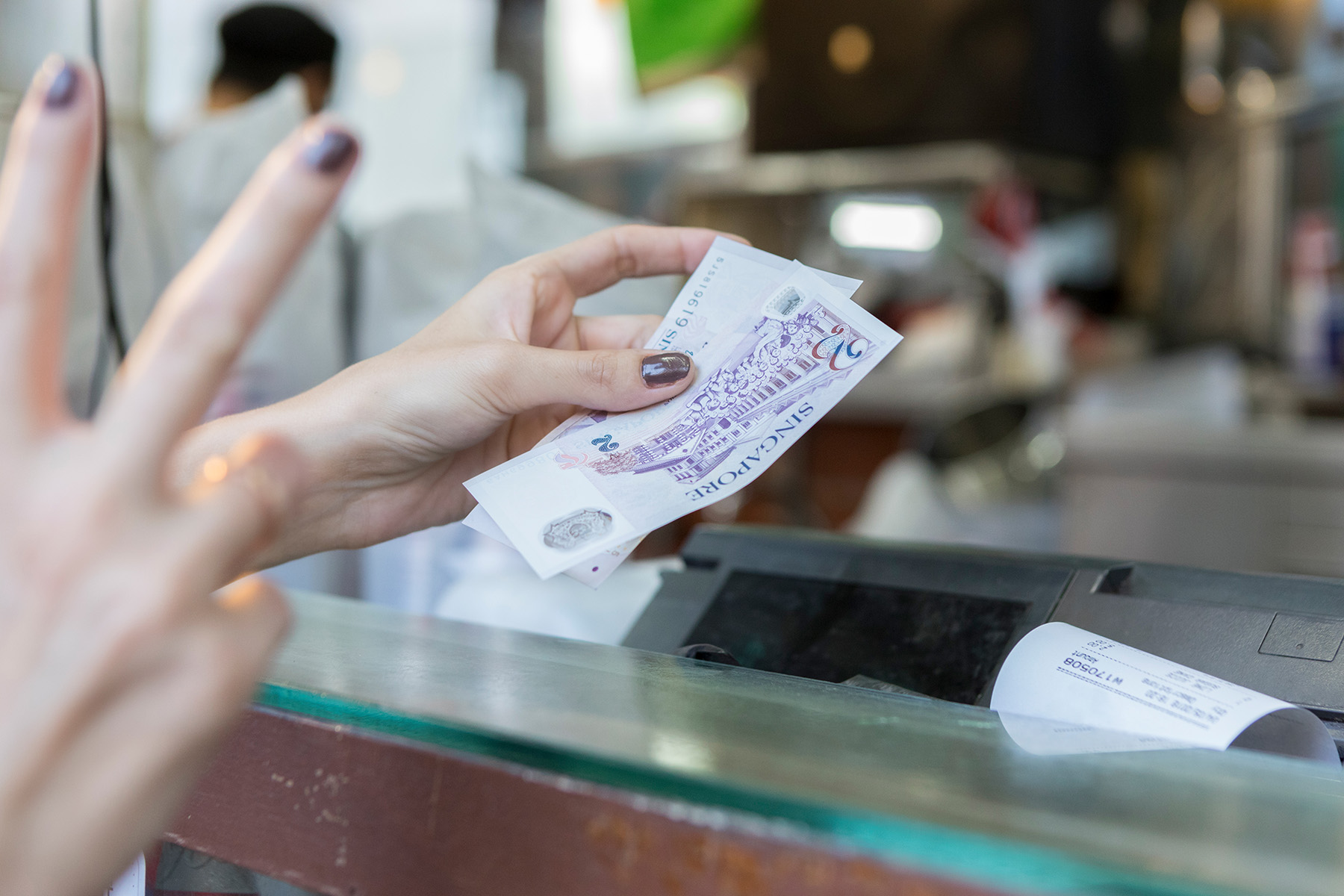
Having said that, old habits die hard and you might still want to carry cash around with you for things like street food and other small transactions.
Checks
Checks are a rare sight in modern Singapore. In fact, the MAS has plans to phase them out completely by 2025.
Although checks are cleared fast – usually on the same working day – they are slower than other payments. The cost of clearing a check – which can be up to S$6 – also makes them an unattractive option.
Debit cards
When it comes to debit cards, there is fierce competition between banks in Singapore, which offer various customer incentives that encourage people to shop around for the best deal.
For instance, many offer cashback of 5% or more on purchases, as long as you hit a minimum spending threshold, which is usually around S$400. Some also offer cashback on all transactions, while others have partnerships with specific shops and services.
When you open a bank account in Singapore, you will automatically receive a debit card. Contactless payments are now standard, so your card should have a chip. Remember, the PIN code is likely to be six digits long, rather than four.
Although a NETS Prepaid Card comes with lower commission fees, credit-enabled debit cards are generally a more common form of payment in Singapore.
Credit cards
You will need approval from your bank to get a credit card. Your credit limit is based on your annual income, however, if you are a very high earner, there are no MAS regulatory limits. Notably, banks may have additional restrictions in place for expats.
Credit cards are the most popular form of payment in Singapore, and account for 36% of POS payments and 42% of e-commerce transactions.

Direct debits and standing orders
Direct debits are commonly used to pay bills in Singapore. You can set up a direct debit through your bank, using an authorization form.
It is important to note that different banks have different conditions regarding what happens if you have insufficient funds in your account. In some cases, you may be charged for this.
If you want to cancel a direct debit, you will need to contact your bank.
Online and mobile payments
Online payments are increasingly popular in Singapore. There are two particularly well-known local systems, which are DBS PayLah! and PayNow.
The latter lets you send funds directly from your account to someone else’s. Notably, you don’t need to know the other person’s bank details to use this service, just their phone number.
Meanwhile, NETS, which allows you to pay in shops, restaurants, and other venues, is not as commonly used these days.
Local money transfers
One of the most popular forms of local transfer is FAST (Fast And Secure Transfers), which is available for use at any time of day.
It has a transaction limit of S$200,000 and has almost immediate results, unlike other types of transfers, which may take up to three business days. Fortunately, most banks in Singapore now offer FAST transfers.

International money transfers
Expats often need to make international money transfers. A standard international transfer, made using an IBAN code, will usually take up to five business days. You may find that expat-targeted bank accounts have favorable rates, but otherwise, you can use a money transfer service.
Many internationals find it cheaper and more convenient to use one of the following services to send money abroad:
What banking fees can you expect to pay?
Fees vary between banks and accounts. You will usually have to pay an account fee of around S$40 to S$50 a month.
Transaction fees can also vary, depending on the type of transaction. A monthly fall-below fee is common. This means that if your daily average balance falls below a certain amount, you will be charged around S$2 to S$5. However, there are some accounts that do not have fall-below fees.
Notably, if you close your account within six months, you will usually have to pay an early closure fee of around S$50.
What offshore banking options are available?
Offshore banking means opening a bank account in a country where you don’t live. This is available for high-net-worth individuals in Singapore.
DBS Treasures is an offshore option and requires assets of at least S$350,000. You can also open an offshore Citibank account, however, you will need to maintain a balance of US$200,000.
Which banks have ethical policies and processes?
In 2019, OCBC became the first Singaporean bank to set up an ethics committee. Since then, the financial sector has taken more interest in ethics and corporate social responsibility.

In 2023, DBS was named the World’s Best Bank for Corporate Responsibility and was particularly commended for its focus on a low carbon footprint and sustainable business practices. Notably, this was the first time a Singaporean bank had won the award.
Measures against banking security and fraud
In general, Singapore has a very safe banking sector. That said, there are concerns about phishing scams. However, the government Scam Alert website provides regular updates about potential problems in the industry.
The MAS has also responded to growing concerns about the safety of digital banking in recent years. It now limits online funds transfers, offering a ‘kill switch’ so that customers can quickly suspend an account. There are also more customer confirmations on transactions.
Some banks have even implemented controversial security features. For example, some may block access to banking apps if users have recently downloaded apps from unsafe sources.
How do you report and replace lost or stolen bank cards?
You will need to contact your bank if your card is lost or stolen. They will then freeze it and issue you with a new card. If your card has been stolen, you should also file a police report.
How do you complain about banks and financial services?
If you have a complaint about your bank or financial institution, the first step is to contact them directly.

If they do not resolve the issue to your satisfaction, you can then escalate it to the Financial Industry Disputes Resolution Center (FIDReC). This can provide an independent, impartial service. However, you will need to contact them within six months of receiving the final reply from your bank.
Does Singapore offer any alternatives to traditional banks?
Historically, Singapore offered some alternatives to traditional banks, such as the Post Office Savings Bank (POSB). Although it was acquired by DBS, it is still a bank in its own right and operates individually with its own branches and mobile app. Aside from this, there are a few cooperative services. However, they are generally not open to expats.
Useful resources
- Monetary Authority of Singapore (MAS) – the website of Singapore’s central bank and integrated financial regulator
- MoneySense – Singapore’s national financial education program, which helps residents manage their money and make sound financial decisions on their own
- NETS – operates Singapore’s national debit scheme
- The Association of Banks in Singapore (ABS) – provides more information about the PayNow payment system
